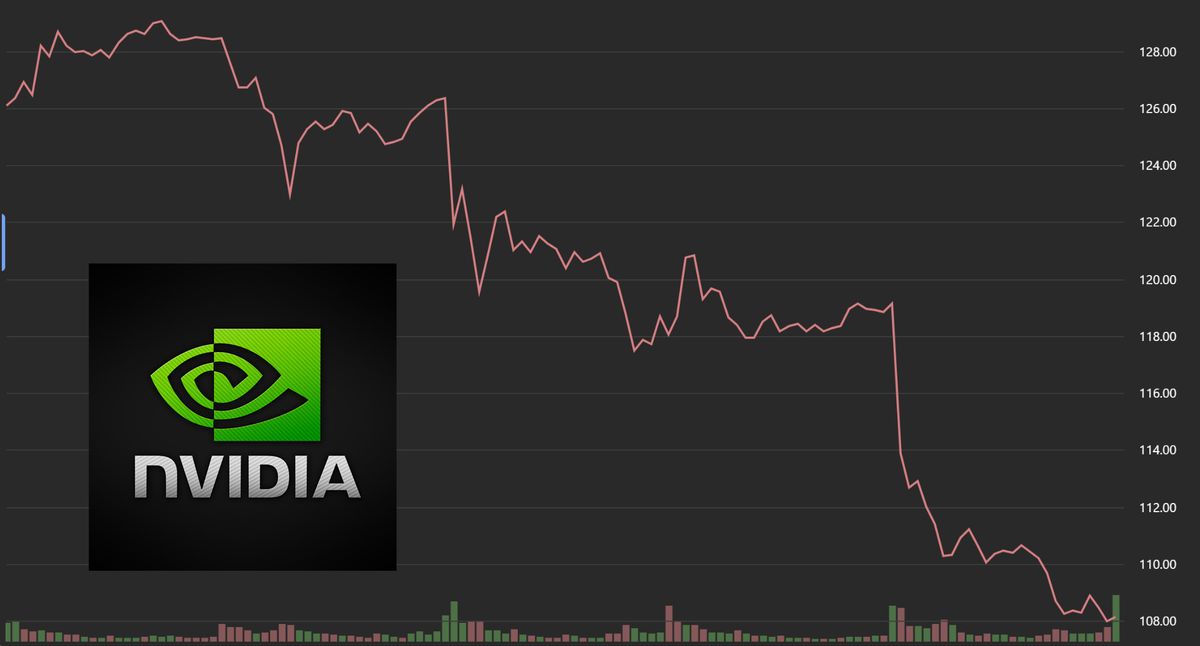What you need to know
- NVIDIA is a global tech company renowned for industry-leading graphics processing units, powering everything from home gaming to massive cloud server arrays.
- NVIDIA enjoyed one of the biggest booms in recent tech memory, becoming the world’s biggest company by market capitalization earlier in the year.
- The boom was fuelled by the artificial intelligent hype train, given that NVIDIA’s GPUs are often used to train and deliver AI models and services associated with them.
- However, concerns that the AI stock frenzy might be without real substance coupled with signs of slowing growth for major global economies has hit NVIDIA and other tech stocks incredibly hard this week.
- Over the course of the day, NVIDIA saw $279 billion wiped off its stock value, with other major tech stocks including Microsoft, Google, Meta, and Apple, all seeing smaller declines.
It’s probably not a fun day for recent NVIDIA traders, after the tech firm suffers a record-breaking drop in market value.
Over the course of the past day, NVIDIA has seen its market capitalization decrease in value to the tune of over $279 billion USD as of writing, which could signal broader difficulties ahead for stocks associated with artificial intelligence and tech in general.
Despite the huge decline, NVIDIA’s stock is still worth double what it was this time last year, fuelled in no small part due to artificial intelligence. NVIDIA’s graphics processing units, most often previously associated with gaming, have become a corner stone of modern cloud computing. Powering everything from cryptography, encryption, and large language model AI training, NVIDIA’s server technology has seen it become the world’s biggest tech firm by market capitalization, supplanting Microsoft and Apple both in the process. The boom was short lived, though.
Fears for slowing growth in major global economies including China and the United States have ripped throughout major stock exchanges over the past week. The United States is expected to share its job market outlook later this week, with many investment firms expecting bad news. However, the stock crash has been uniquely harsh on NVIDIA. It’s perhaps in part to the recency of its stock boom, with interest from smaller investors making up a disproportionate amount of its stock. But, some analyses pointed to dampening interest in AI-associated stocks in general.
Just this week, reports emerged that OpenAI is seeking further investment from major tech companies (including Microsoft) in a desperate bid to stay afloat. OpenAI powers services like ChatGPT and Microsoft Copilot, which have thus far proven to be little more than search engines with extra steps, at least for most.
Indeed, beyond silly memes, AI-generated content has yet to find any real footing in mainstream adoption, particularly with consumers. There are reports that ChatGPT’s user base is dropping, and AI features have done little to help Microsoft Bing make even the slightest dent in Google’s search dominance. What few services that do exist out there either do so for free, or for a fairly minimal monthly fee. These services are astronomically expensive to run, and so far, sport an unclear use case. So far, the best Microsoft could come up with is Windows Recall, a feature that will record your screen and will let you “recall” previous actions with AI contextual search. Windows Recall was deemed a “privacy nightmare” almost immediately after its announcement.
Another piece of news that might’ve spooked investors is unconfirmed reports (via Bloomberg) that the U.S. Department of Justice has issued a subpoena to NVIDIA, potentially on anti-trust grounds. Similar reports have done little to dissuade Google’s investors, though, despite rumors that the DOJ may even be seeking to break up Google into separate, smaller entities.
Despite the record-breaking contraction, NVIDIA’s stocks are still astronomically higher than they were just a year ago. There’s no sign any of the major players are going to slow down on building technologies based on AI models, either. Just because the “profitability” case might elude investors today, that doesn’t mean a significant breakthrough couldn’t potentially change everything for whichever tech company gets there first. Or hey, maybe it truly is all hype. Time will tell.

